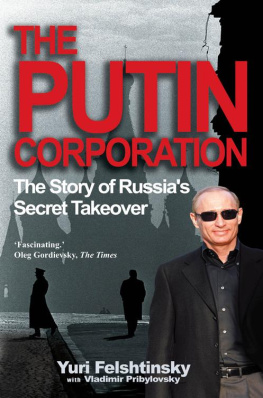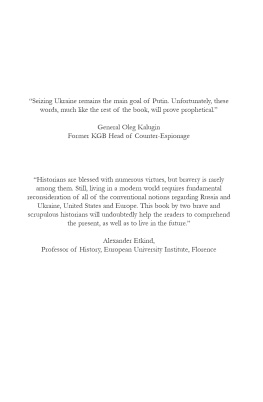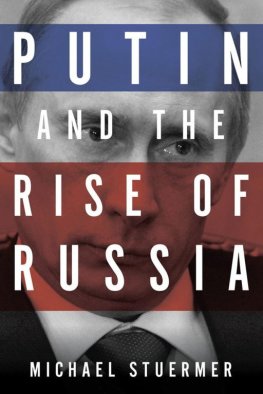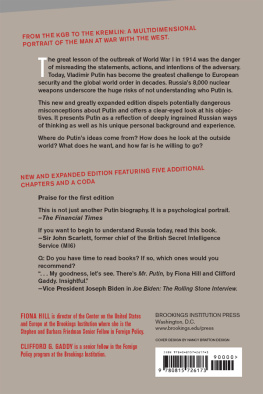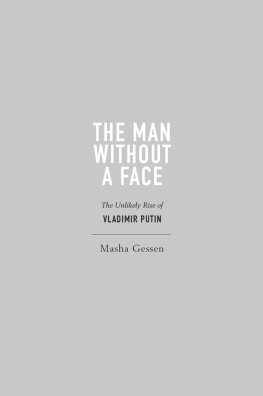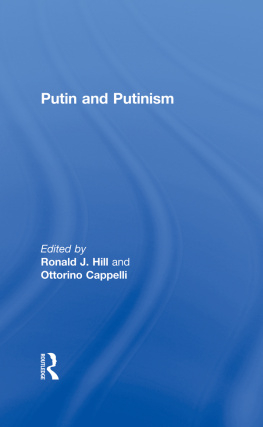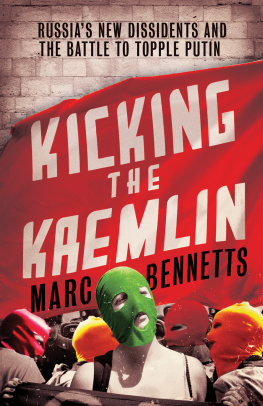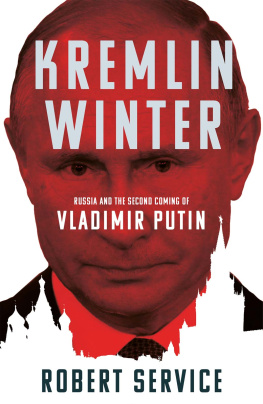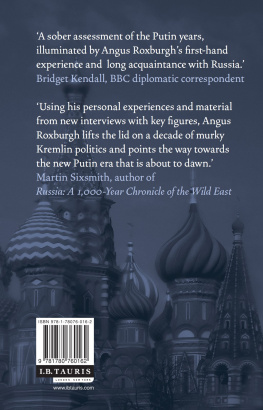Required reading A catalogue of corruption fascinating.
Oleg Gordievsky, The Times
Crooks and killers compelling a clear and accurate picture the strength of this book is research.
Vladimir Bukovsky Observer
Contains extraordinary detail about the way this KGB clan managed to occupy an estimated 7 in 10 of all top state positions, establish control over the countrys natural resources, and eliminate all rivals.
Telegraph
Scandals in post-Soviet history a narrative of infamy and camouflage.
Economist
A wealth of detail convincing as it catalogues a series of crimes perpetrated by Putin and the FSB.
Owen Matthews, TLS
Putins shadowy world unnerving necessary reading.
Sunday Business Post
Dodgy deals and horrible murders.. you end up wondering why quite so many of Vlads critics have ended up dead.
New Statesman, books of the year
Russias March 2012 presidential election showed that Vladimir Putins position is unassailable. Why is he on course to lead Russia for a longer period than Stalin?
WELCOME TO THE PUTIN CORPORATION
Based on meticulous research, The Putin Corporation investigates the intimate relationship between Russias oligarchs and Vladimir Putin. Why do they allow their economic, financial, state and business interests to be run by a man who was in Soviet times an obscure KGB officer stationed in East-Berlin? Is Russia experimenting with a new form of tyranny, where the whole country is run like a business for a small group of shareholders?
Britain is the Russian oligarchs home from homethey buy up sports clubs, newspapers and high-security mansions, sue, or even surreptitiously murder one another? What is life in Russia like?
Yuri Felshtinsky received doctorates from Rutgers University and the University of Moscow, and was a research fellow at the Hoover Institute, University of Stanford. He is the author of many books on the Russian secret service, including Blowing up Russia with Alexander Litvinenko.
From Moscow, Vladimir Pribylovsky, a journalist and scholar of Byzantine history, runs several (foreign based) human-rights websites in Russian.
CONTENTS
According to the official narrative, Russia is a democratic country, and from 2008 to 2012 it was governed jointly and in complete harmony by President Medvedev and Prime Minister Putin (the tandem), both of them lawfully elected. But the semi-official story was that the two halves of the tandem were not quite equally balanced in weight: Putin was older and more experienced, and therefore he was more equal and more important.
While the second view is closer to the truth, it is also not entirely correct.
The very top of the governing elite during Medvedevs presidency was not a tandem, a duumvirate, but a triumvirate, made up of Prime Minister Putin, the shadowy figure of Igor Sechin, one of several deputy prime ministers, and President Medvedev. Medvedev was not even the second figure in the hierarchy but only the third wheel on the tricycle.
The fact is that the secret hierarchy and functions of Russias top officials bear no relation to their public titles. Vladimir Putin was called the prime minister, but in reality he was the sovereign, the daddy-czar perhaps not wholly a traditional autocrat or monarch, but he was certainly not a constitutional ruler. His power was limited, not by the constitution or by laws but, rather like a CEO, by a secret corporation of shareholders and its customs (akin to a thieves code): behind-the-scenes agreements with shadowy influence groups, family, friendship, and administrative ties. Apart from being the czar, Putin was also his own minister of foreign affairs (while the nominal minister, Sergey Lavrov, was no more than a foreign policy advisor).
Igor Sechin was called a deputy prime minister (and not even the first deputy), but in reality he was precisely a prime minister. He was not exactly the head of government (since not all ministers were subordinate to him some answered directly to the CEO), but within the government he was nonetheless first among equals. He was responsible for a large part of the economy (except finance); significantly, the security organs, headed by his protg Alexander Bortnikov, were effectively under his control.
Dmitry Medvedev was called president and head of state, but in reality he was something like a deputy prime minister for a wide range of issues, in particular, the legal sphere, as well as an advisor to the sovereign-CEO on personnel and certain other questions (for example, democracy). In the legal sphere, Medvedev was practically all-powerful this was his domain while as an advisor on personnel issues he was influential, but not the most important. The main advisor on personnel issues was former KGB General Viktor Ivanov. And even Sergey Sobyanin (formerly deputy prime minister and head of the Administration of the President of Russia, since October 2010 mayor of Moscow) possibly had more influence over personnel policy in 2008-2010, including the appointment of governors, than did Medvedev, who signed off on these appointments.
Formally the head of the FSB, the Russian secret service, Bortnikov was directly accountable to President Medvedev, but his real bosses were Putin and Sechin. Viktor Ivanov was as of March 2012 called the head of the Federal Service for Narcotics Control (Rosnarkokontrol), but regardless of his official title, over the past 15 years he has been and remains Putins main advisor on personnel issues. In addition, the Federal Service for Narcotics Control is effectively a second KGB, which monitors the activities of the first KGB Bortnikovs FSB. The need for a second KGB arose because the Ministry of Internal Affairs, which since Soviet times had provided a counterweight to the KGB/FSB spooks, ended up completely under FSB control. In fact, it fell under the control of the St. Petersburg-Karelian clan headed by Patrushev, former head of the FSB, current secretary of the Security Council of Russia, and Nurgaliyev, current minister of internal affairs.
Sergey Naryshkin, who under Medvedev was head of the Administration of the President, should have been, in keeping with his title, responsible for implementing and executing the presidents decrees. But in reality, Naryshkin Putins classmate from the Andropov Krasnoznamenny Institute of the KGB served as the presidents minder and answered directly to prime minister-CEO Vladimir Putin. Vladislav Surkov was officially called first deputy head of the Administration of the President, but unofficially occupied positions that would be impossible in a democracy: deputy prime minister of ideology and minister of the parliament and political parties.
The most affluent class in Russia is the high bureaucracy, the

